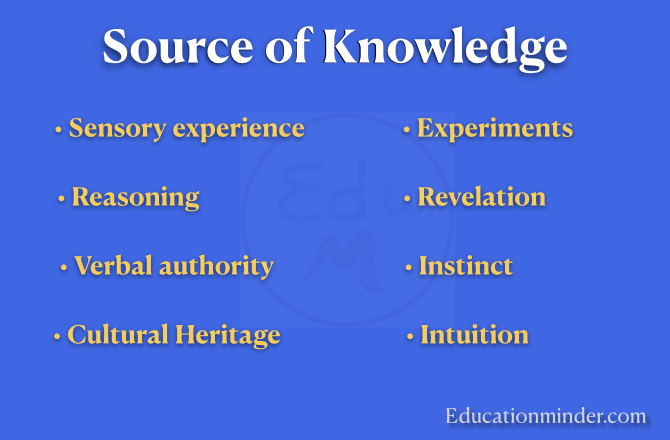Knowledge is the information, understanding, and awareness that an individual possesses about a particular subject. It refers to the familiarity with facts, truths, or principles that enable the person to make decisions, solve problems and engage in various activities effectively.
Following are some definitions of knowledge:
According to Plato,” Knowledge is perception or truth, knowledge is true belief, knowledge is a true belief with a rational account.
According to John Locke,” Knowledge is the perception of agreement or disagreement of two ideas.
According to Rusk,” Knowledge is what enlightens the human mind.
Sources of Knowledge
• Sensory experience
Sensory experience is the main source of knowledge. Gaining knowledge through the experiences of the senses is called empiricism. Every person has five senses: sight, hearing, smell, taste, and touch (tactile sensation). These senses act as the gateway through which knowledge from the external world reaches our consciousness.
• Reasoning
Reasoning is another source of knowledge. Gaining knowledge through logical reasoning is called rationalism. It is the process of analyzing, understanding, and evaluating information or making inferences from facts, observations, and premises.
There are two types of reasoning: inductive reasoning and deductive reasoning.
• Revelation
It is also called the divine or supernatural source of knowledge. It is based on religious beliefs. It is a common belief that revelations come in the form of direct contact with a higher being. It can not be changed. It is subjective and based on personal belief. Different religions have their own understanding of revelation.
• Intuition
When we gain knowledge through our inner conscious, called intuition. It is said that intuition arises from a combination of past experiences, subconscious processing, and pattern recognition. It is not logical. It has no shape and can be felt only.
• Instinct
Instinct is an innate tendency that is present in humans as well as in animals. Some basic human instincts are survival instinct, social instinct, maternal instinct, and intuition. Some examples of instinct are:
- we automatically withdraw our hand when we touch something hot.
- From an early age, we learn to recognise facial expressions, vocal cues, and body language. These help us to understand the emotions and intentions of others.
• Experiments
Experiments are the systematic process of observation, hypothesis, formulation, experimentation, and formulation. These are considered as the true source of knowledge and the only way for researchers or scientists to gain knowledge. Through experiments, our understanding of the world is continually expanded.
• Verbal authority
Authority figures are also a main source of knowledge. It includes parents, teachers, experts, and mentors. Through them, individuals receive knowledge that has been acquired, researched, or experienced by others. People learn new things and develop insights that may not have been possible for them to learn from personal experience alone.
Read also:
Concept, nature, and importance of curriculum
NEP 2020: ppt, aims and objectives, highlights
Some other sources of knowledge are:
• Education
Education provides access to a wealth of knowledge. Education enable individuals to use this knowledge in the real world contexts.
• Media
There are several ways in which media contributes to our knowledge acquisition. These are news, interactive learning, access to expertise, etc.
• Internet
We can get vast amount of knowledge through online learning, online journals, online communities and various others digital resources.
• Traditional and cultural heritage
Through cultural heritage, knowledge passes from one generation to another generation.














1 Comments
I think this can be classified simply into primary and secondary sources
ReplyDelete